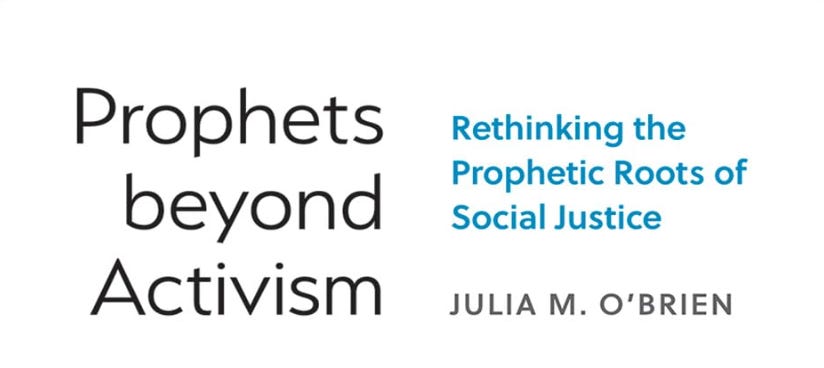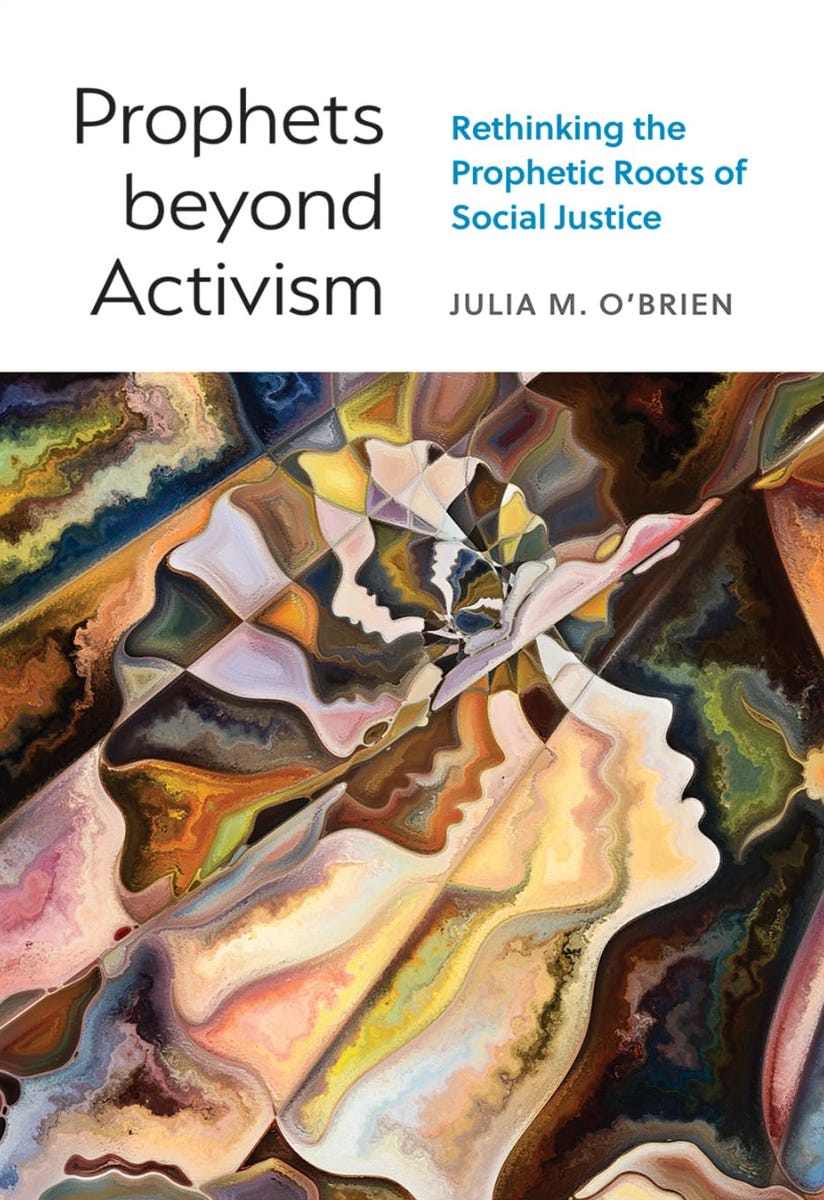Prophets and Social Justice
In the late 1990s I got it into my head to work on the nature of prophecy in Israel's and Judah's history. At the time I read an Eisenbraun’s anthology about ancient prophecy to become more aware of the nature of scholarship. What captured my attention at that time was the importance of “conversion” (shuv) in the prophets. That led instead to a book on conversion (Turning to Jesus), and I never really got back to a study of the prophets. However, in the last 25 years I've read numerous books and studies about ancient prophecy, so I still have an interest.
Which is why I am reading the new book by Julia M. O’Brien, Prophets Beyond Activism: Rethinking the Prophetic Roots of Social Justice, which is both an academic study and a very accessible study of what the prophets were actually doing. It could be taken as an irony that a mainline scholar like her finds the ancient prophets as not as concerned with social justice as many make them out to be today. It is this angle that gave me an interest in this book. I want to see how she works this out.
First, O'Brien sets Israel's prophets in the context of ancient prophetic activity in the world of eastern Syria and modern day Iraq. That is, Mari and Nineveh, where “Individuals are described as receiving communication from the gods audibly or through dreams and visions or both.” Such experiences came from a diverse people and led to communication, usually with the king. The worldview and context for these prophets was a belief that God was both unpredictable and arbitrary, and it was the prophets and other diviners who sought to discern through a variety of means what the gods were up to. They examined the stars, the entrails of animals and the flight patterns of birds period from these the diviners made statements about the intentions of the gods.
Both Israel’s/Judah’s authorities and Christian scholarship saw these diviners and these other prophets as false prophets in comparison with Israel's prophets. Yet, any careful study by way of comparison leads to numerous parallels or at least similarities. King Saul was an ecstatic; when the prophet Elijah was sick, he put his hands on a king and told him to shoot an arrow to determine God's will for the battle. Israel's prophets, like their contemporaries, said “Thus says the Lord.” Most of these prophets in the ancient world supported kings, and the prophets Samuel and Nathan anointed kings. The writings of the prophets were collected in the ancient world (cf. Isaiah 8:16; 29:11-12). And, it was common for kings, other prophets, and leaders to question the words and claims of prophets (cf. 1 Kings 18, 22; Amos 7; Jeremiah 28, 36). Her conclusion: “In the biblical accounts that I've highlighted so far, Israelite prophets are not primarily teachers of morality and do not address social inequities … they advise kings and discern divine truth by interpreting signs. They delivered divine messages explaining what will soon happen and why, and in this way they serve as agents of foretelling the future.” Thus, the orthodox position that prophets were social critics and social justice activists is in need of nuance if not correction.
Second, she examines the editing of prophetic books (redaction). There are two collections of prophetic books in the Old Testament: the latter prophets (we call them the Historical Books) and the prophets (Isaiah to Malachi). O'Brien's contention is that these books contain what she calls “retrospective theology.” That is, they are productions of the Persian, that is post-exilic period, and they revise the prophetic books to fit the dominant theology and historiography.
That historiography is that if the people are obedient they will be blessed; if they are disobedient they will experience discipline and even exile (2 Kings 17:13). This is a common historical-critical understanding of the rise of the prophetic books in the Bible. The prophetic books are then theo-political literature. A critical posture toward these books sets them in various contexts, with at times a capacity to trace developments and shifts. Noticeably, the prophets begin books with third person notations: “The vision of Isaiah son of Amoz, which he saw concerning Judah and Jerusalem in the days of Uzziah, Jotham, Ahaz, and Hezekiah, kings of Judah” (Isaiah 1:1). Thus, this is not an “I have this to say” but someone putting down what Isaiah prophesied. The issues are Who did this?, and When did they do this?, and add to this in O’Brien’s study, Why?
The prophetic literature of the Old Testament (Hebrew Bible) presents a rather unified message that we often call the deuteronomic history or the deuteronomic theology, and label all other prophetic voices as false prophets. What is clear, is that there were alternative prophets when these prophets were speaking and when their books were put into print.
I find the following two examples both in tension with one another and a reminder that “he who writes the story controls the glory”:
Joel 2:28 Then afterward
I will pour out my spirit on all flesh;
your sons and your daughters shall prophesy,
your old men shall dream dreams,
and your young men shall see visions.
29 Even on the male and female slaves,
in those days I will pour out my spirit.
Zech 13:3 And if any prophets appear again, their fathers and mothers who bore them will say to them, “You shall not live, for you speak lies in the name of the LORD,” and their fathers and their mothers who bore them shall pierce them through when they prophesy. 4 On that day the prophets will be ashamed, every one, of their visions when they prophesy; they will not put on a hairy mantle in order to deceive…
So what will the future be? Lots of prophets or not? At the heart of her argument is that the historical context reveals a prophet as an agent of a worldview, a part of a system, and more often not that system was either royal or temple.
So, she concludes: “The orthodoxy that the ancient Israelite prophets and their prophetic heirs were social activists doesn't hold up to historical investigation of the texts in which they are described.”




Hmmm interesting. Thank you Scott